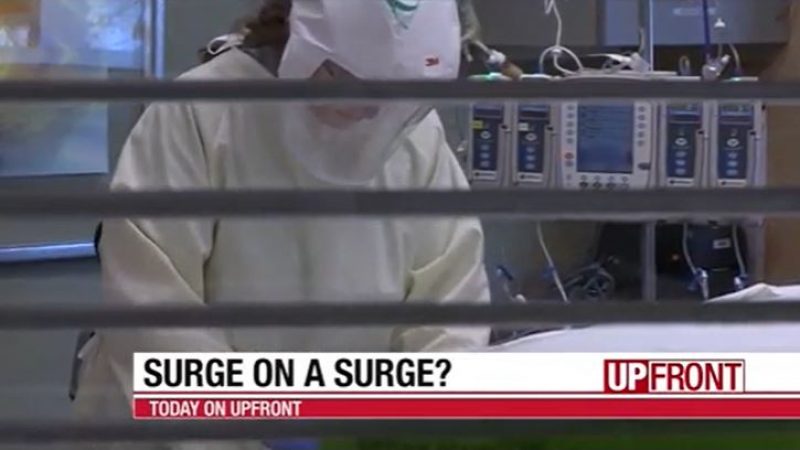An executive of a northern Wisconsin hospital said he and medical experts are concerned about a post-Thanksgiving surge of COVID-19 patients.
In an interview aired Sunday on “UpFront,” Matt Heywood, president and CEO of Aspirus in Wausau, said it’s possible the hospital could see a “surge on a surge.”
Heywood said Aspirus already was caring for more than 100 COVID-19 patients just before Thanksgiving. At its peak, it had 130 COVID patients, he said.
“At a certain point, if this continues to have a surge on a surge, your biggest constraint is going to be your people. Making sure they stay healthy, making sure that you have the people to take care of the patients,” Heywood told “UpFront,” which is produced in partnership with WisPolitics.com.
>> WisPolitics is now on the State Affairs network. Get custom keyword notifications, bill tracking and all WisPolitics content. Get the app or access via desktop.
The hospital is even using its garage as an overflow area, he said, trying not to mix COVID and non-COVID patients.
Heywood said he didn’t think the situation would reach a point where the hospital would be forced to ration care.
“We’ve done a lot to make sure we have the bed capacity, we have the staff, we make sure we have the supplies and the (personal protection equipment),” he said.
He said he has prepared his staff for several more months of intense COVID care.
“I’ve been honest with them, that we look forward at another three to four months, until we can start to see a vaccine in the spring really start to take hold for our country, or in the summer, and that means we’ve got another three to four months of this, and that is wearing on staff,” Heywood said.
Heywood said a field hospital in the central part of Wisconsin, similar to the one set up in Milwaukee County, could help patients from Wausau, Green Bay and the Fox Valley. He also said there is a need for a field hospital to accept “higher acuity” patients.
“Milwaukee is a long journey for many patients and their families to have one of their loved ones go to,” Heywood said.
Also on the program, a COVID-19 patient said she is still having difficulty after first getting coronavirus in July.
Maria Witliff is one of the patients known as a “long hauler,” experiencing debilitating effects of the virus weeks or months later.
“The exhaustion was horrific,” Witliff said. “You have absolutely no energy. I was so weak.”
Witliff is being treated at Ascension’s new clinic for long-haul patients.
Dr. Erin O’Tool is an Ascension family medicine physician treating COVID-19 long haulers at the clinic in Oak Creek.
O’Tool said what’s defined as “long COVID” is affecting people across age groups, regardless of underlying conditions.
“People just will have a bout of illness, and think they are over it, and then things will just continue to be residual, which can be quite trying from a mental standpoint,” O’Tool said.
Just how long the long-phase period will last is an open question, O’Tool said.
In another segment, Wisconsin Bankers Association President and CEO Rose Oswald Poels said some businesses, like grocery stores and mortgage lenders, are doing well in the COVID economy, while small shops, restaurants and hospitality-related businesses continue to struggle.
The economic crisis and the health crisis are going hand in hand, Oswald Poels said, but the vaccines on the horizon bring optimism for the economy to recover.
See more from the program:
http://www.wisn.com/upfront


